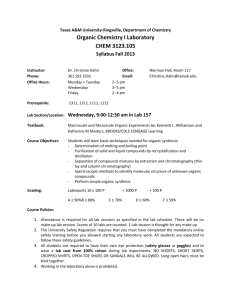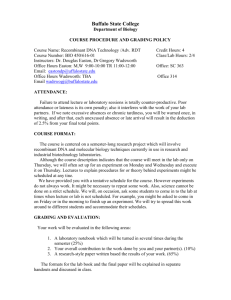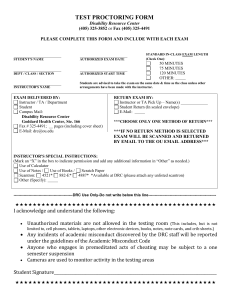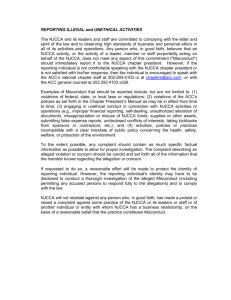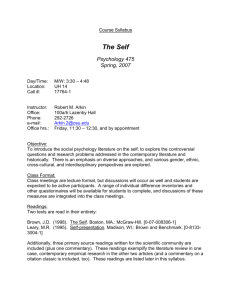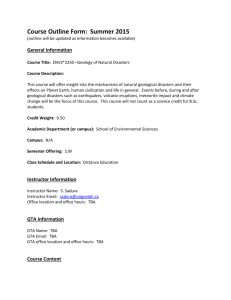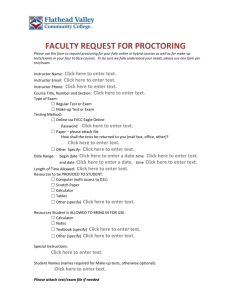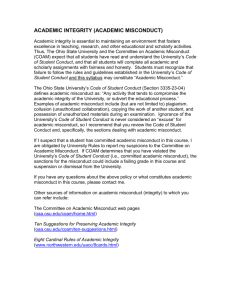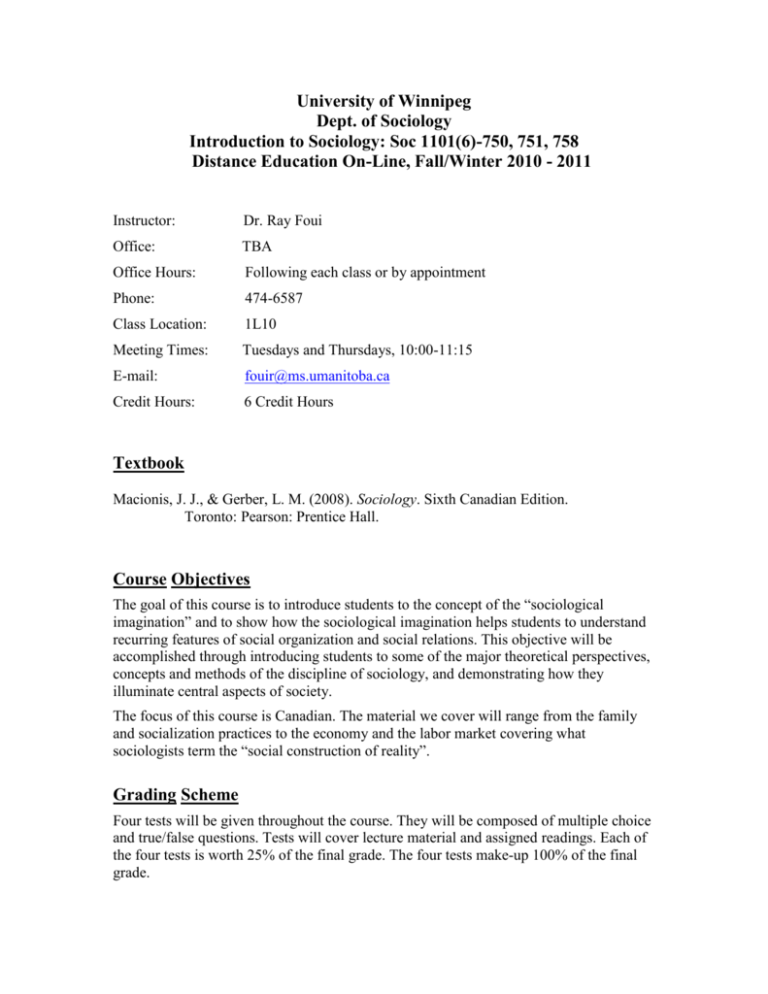
University of Winnipeg
Dept. of Sociology
Introduction to Sociology: Soc 1101(6)-750, 751, 758
Distance Education On-Line, Fall/Winter 2010 - 2011
Instructor:
Dr. Ray Foui
Office:
TBA
Office Hours:
Following each class or by appointment
Phone:
474-6587
Class Location:
1L10
Meeting Times:
Tuesdays and Thursdays, 10:00-11:15
E-mail:
fouir@ms.umanitoba.ca
Credit Hours:
6 Credit Hours
Textbook
Macionis, J. J., & Gerber, L. M. (2008). Sociology. Sixth Canadian Edition.
Toronto: Pearson: Prentice Hall.
Course Objectives
The goal of this course is to introduce students to the concept of the “sociological
imagination” and to show how the sociological imagination helps students to understand
recurring features of social organization and social relations. This objective will be
accomplished through introducing students to some of the major theoretical perspectives,
concepts and methods of the discipline of sociology, and demonstrating how they
illuminate central aspects of society.
The focus of this course is Canadian. The material we cover will range from the family
and socialization practices to the economy and the labor market covering what
sociologists term the “social construction of reality”.
Grading Scheme
Four tests will be given throughout the course. They will be composed of multiple choice
and true/false questions. Tests will cover lecture material and assigned readings. Each of
the four tests is worth 25% of the final grade. The four tests make-up 100% of the final
grade.
Policy On Grades And Tests
The following percentage/letter scale will be used:
90 – 100
A+
85 – 89
A
80 - 84
A-
76 – 79
B+
70 – 75
B
66 – 69
C+
60 – 65
C
50 – 59
D
0 – 49
F
If a test is missed for a health- related reason, the student must get in touch with the
professor as soon as possible to present his/her signed medical certificate in order to
arrange a make-up test. Ordinarily, tests must be made-up within one week. Failure to
request a make-up test within the expected time frame may result in ineligibility for a
make-up test and a mark of zero for the missed test.
The university recognizes the right of all students to observe recognized holidays of their
faith, which fall within the academic year. With instructor discretion, necessary
arrangements can be made to ensure studies are not jeopardized. The instructor should be
notified of a student’s intended absence in advance and at least three weeks notice of
absence should normally be given where special arrangements are sought.
Students with documented disabilities requiring academic accommodations for
tests/exams or during lectures are encouraged to contact the Coordinator of Disability
Services at 786-9771 to discuss appropriate options. Specific information about DS is
available on-line at www.uwinnipeg.ca/index/services-diability .All information about
disability is confidential.
Academic Regulations and Policies
It is your responsibility to be familiar with the information on Academic Regulations and
Policies, Section VII of the 2010-11 Campus Guide. This section covers classroom
regulation, grading, transcripts, challenge for credit, academic standing, student discipline
(academic and non-academic misconduct), appeals including grade appeals, University
Policies and Codes and graduation.
A summary of important information regarding Academic Misconduct follows:
Forms of Academic Misconduct:
Plagiarism: includes presenting other people’s published or unpublished work in
part or as a whole as your own. This includes material from lab manuals, essays,
journal articles, books etc. Plagiarism also refers to submitting the same work in
more than one course without both instructors’ permission and to the situation
where two or more students submit identical (or nearly identical) work for
evaluation when the work was to be completed individually.
Cheating: includes copying another person’s answer on a test, communicating
with another person during a test or exam, consulting unauthorized sources
(including written and electronic sources), obtaining a copy ( of all or part) of a
test, exam or assignment before it is officially available, purchasing tests, essays
or other assignments and submitting the work as your own.
Improper Academic/ Research practices include: fabricating or falsifying results,
using other people’s research findings without permission, misrepresenting
research results or methods, referring to non-existent sources or investigators,
contravening the University’s Policy and Procedures On Research Integrity.
Obstructing academic activities of another person; for example, interfering with
another person’s access to pertinent resources or information to gain academic
advantage.
Impersonation: both impersonation of another individual or allowing someone to
impersonate you.
Falsification or Modification of an Academic Record: including tests, transcripts,
letters of permission, etc.
Aiding and Abetting Academic Misconduct.
Penalties for Academic Misconduct:
Can include, but are not limited to:
Written warning
Lower of failing grade on a test
Lower or failing grade in a course
Denial of admission or readmission to the University
Forfeiture of University awards or financial assistance
Suspension from the University for a specified period of time
Withholding or rescinding a UW degree, certificate or diploma
Expulsion from the University
Procedures:
All allegations of academic misconduct must be reported initiating a process which
involves several steps. These include procedures involving the instructor of the course in
which the misconduct is alleged to have occurred, the Departmental Review Committee,
and the Senate Academic Misconduct Committee
Voluntary Withdrawal (Please refer to the 2010-11 Calendar for Voluntary withdrawal
procedures)
***You must formally withdraw from a course. If you simply stop going to classes, you
may receive an “F” on your transcript and loss of tuition credit.
The voluntary withdrawal date for this course is January 21/2011
Assigned Readings and Requirement Due Dates
Sept 9-23
Chapters 1& 4
Sociological Perspective 1-25:
Society 82-105
Sept 28-Oct 7
Chapter 2
Sociological Investigation 26-53
Oct 12-21
Chapter 3
Culture 54-81
Oct 26
Oct 28- Nov 9
(Articles: “Culture of the Nacirema” and “The Amish”)
TEST #1
Chapter 5 & 6
Socialization 106-129: Social
Interaction 130-151
Nov 11-18
Chapter 9
Deviance 208-237
(Article: “On Being Sane in Insane Places”)
Nov 23- Nov 30
Chapter 10& 13
Social Stratification 238-263:
Gender Stratification 316-347
Dec 2
TEST #2
Jan 5- 13
Chapter 14
Race and Ethnicity 348-377
Jan 18- 27
Chapter 18
Families 462-489
(Article: The Unnatural Family)
Feb 1- 10
Chapter 19
Religion 490-515
Feb 15–17
Chapter 20
Education 516-539
Feb 21 -25
MID-TERM BREAK
Mar 1
TEST #3
Mar 3 -10
Chapter 23
Collective Behaviour and Social
Movements 598-623
Mar 15-18
Chapter 17
Politics and Government 430-461
Mar 22- 29
Chapter 22 & 24
Population 566-576:
Social Change 624-644
Mar 31
TEST #4
No classes: Nov. 11- Remembrance Day
Note: All of the above designated chapters may not be covered



